Source: News release by the Society for Research in Child Development
Teens’ ability to empathize – to understand others’ perspectives and emotions, and to care for their wellbeing – is an important contributor to their relationships, including with friends.
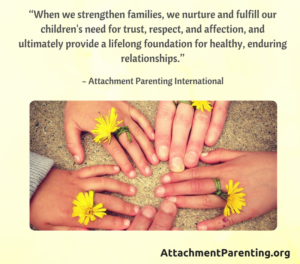 Prior research shows that teens who have more secure family relationships report higher levels of empathy for others, but little research examines whether teens with more secure family relationships actually show greater empathy when observed in real-life interactions with peers, or whether their empathic capacities show different patterns of growth over time.
Prior research shows that teens who have more secure family relationships report higher levels of empathy for others, but little research examines whether teens with more secure family relationships actually show greater empathy when observed in real-life interactions with peers, or whether their empathic capacities show different patterns of growth over time.
A new study – by researchers at the University of Virginia – tested whether teens’ secure, supportive family relationships at age 14 related to their ability to provide their friends with empathic support across adolescence and into early adulthood.
Findings indicate that secure attachment – reflecting on close relationships in an emotionally balanced, coherent, and valuing way – predicts teens’ ability to provide empathic support to their close friends.
“What’s especially interesting is that close friends also sought out more support from securely attached teens,” said Jessica Stern, postdoctoral fellow at the University of Virginia.
Related: The room of a teenage boy, a look at attachment parenting with teens
While having secure family relationships at age 14 predicted greater empathy with peers across adolescence, those teens who did not have secure family relationships in early adolescence showed a pattern of catching up, increasing their empathy toward close friends as they developed.
This study is among the first to examine associations of attachment with the development of empathic support using longitudinal methods and observations of empathic support for friends across mid-adolescence.
The findings were published in the journal Child Development. This research was supported by the National Institute of Child Health and Human Development and the National Institute of Mental Health.
The study featured a sample of 184 adolescents (86 males, 98 females) recruited from a public middle school (7th and 8th grades) in suburban and urban populations from the southeastern United States. Adolescents in the study were 58% Caucasian, 29% African American, 8% mixed race or ethnic, and 5% other identity groups.
In the current study, teens at age 14 responded to an interview about their attachment relationships, unlike most prior studies which used self-report measures of attachment style and empathy. Teens who described their attachment relationships as supportive, who valued those relationships and reflected on them with coherence and emotional balance, were rated as more secure.
Related: How to heal attachment with your teen
At ages 16, 17 and 18, teens and their nominated closest friend participated in a video-recorded, 6-minute task in which teens helped friends deal with a problem they were facing. Friends’ bids for support, as well as teens’ ability to provide empathic support, were coded from videos of this task.
The findings suggest a strong association between a teen’s having a secure attachment – or perspective on attachment relationships as supportive – and the development of the capacity to provide empathic support to close friends across a 4-year period of adolescence.
Results also suggest that friends’ support-seeking develops alongside teens’ ability to deliver empathy, with support-seeking helping empathy to develop and empathy fostering support-seeking from friends as well.
“Investing in the quality of teens’ family relationships early in adolescence may be important for building empathy and positive interactions with peers,” Stern said. “Parenting programs, family therapy when needed, and school-based interventions that help young teens feel safe and supported in their relationships with adults – not only parents but teachers, mentors, and extended kin – may equip teens to ‘pay it forward’ in their empathy and care for others.”

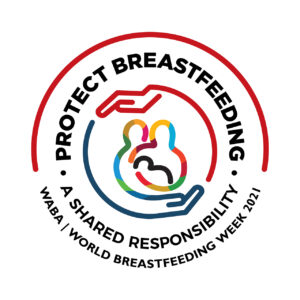 Nurturing parenting is invariably linked to breastfeeding. While not all mothers are able to breastfeed, we recognize that breastfeeding – and breastfeeding behaviors while giving a bottle – is one of nature’s best teachers of new parents in how to sensitively and consistently respond to their baby as well as learn to develop the reciprocity of a healthy relationship between parent and child.
Nurturing parenting is invariably linked to breastfeeding. While not all mothers are able to breastfeed, we recognize that breastfeeding – and breastfeeding behaviors while giving a bottle – is one of nature’s best teachers of new parents in how to sensitively and consistently respond to their baby as well as learn to develop the reciprocity of a healthy relationship between parent and child. Yet, this increasingly disproved child-raising practice remains legal in all
Yet, this increasingly disproved child-raising practice remains legal in all 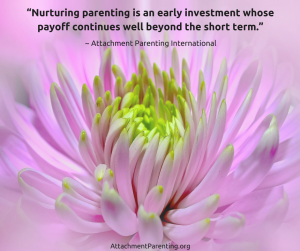 University of Chicago (U.S.) economist James Heckman, however, is known for his research into how a nation that invests in policies that promote healthy families is investing in its future economy. While he supports expanding early child care and education programs, he does not disregard the critical value of a healthy childhood environment in the home.
University of Chicago (U.S.) economist James Heckman, however, is known for his research into how a nation that invests in policies that promote healthy families is investing in its future economy. While he supports expanding early child care and education programs, he does not disregard the critical value of a healthy childhood environment in the home.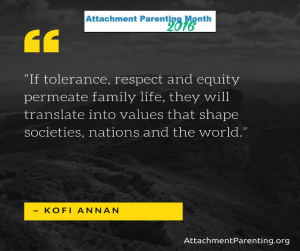 Extroversion and introversion are two of many character traits that are inborn – meaning an individual’s brain is hard-wired to gravitate toward more stimuli (extroversion) or less stimuli (introversion) to contribute toward their well-being. These character traits tend to gain attention when one of these temperament types is prized by the mainstream culture and the other is misunderstood.
Extroversion and introversion are two of many character traits that are inborn – meaning an individual’s brain is hard-wired to gravitate toward more stimuli (extroversion) or less stimuli (introversion) to contribute toward their well-being. These character traits tend to gain attention when one of these temperament types is prized by the mainstream culture and the other is misunderstood.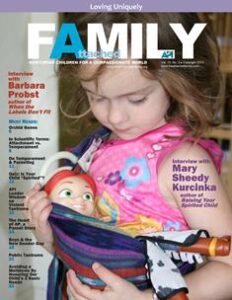 Among API’s resources is an issue of the Attached Family magazine, “Loving Uniquely,” which celebrates the differences between children and how parenting is rarely one-size-fits-all even within the confines of a family. We delve into temperament and how it intersects with parenting and the development of attachment style, and we challenge the notion that every hard-to-handle child needs a diagnosis.
Among API’s resources is an issue of the Attached Family magazine, “Loving Uniquely,” which celebrates the differences between children and how parenting is rarely one-size-fits-all even within the confines of a family. We delve into temperament and how it intersects with parenting and the development of attachment style, and we challenge the notion that every hard-to-handle child needs a diagnosis.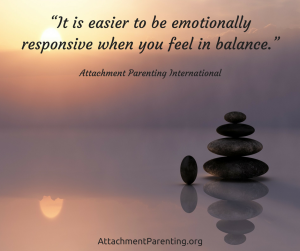 This, many parents agree, may be the hardest principle of all to follow. It’s not that we don’t want to. Sometimes, balance seems impossible to attain in our child’s current developmental stage or a particular calendar season.
This, many parents agree, may be the hardest principle of all to follow. It’s not that we don’t want to. Sometimes, balance seems impossible to attain in our child’s current developmental stage or a particular calendar season.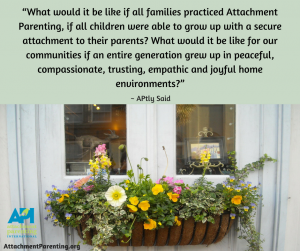 You may be living somewhere that nurturing parenting is a foreign concept to anyone outside your family. You may be living somewhere that has a strong, supportive nurturing parenting group.
You may be living somewhere that nurturing parenting is a foreign concept to anyone outside your family. You may be living somewhere that has a strong, supportive nurturing parenting group.